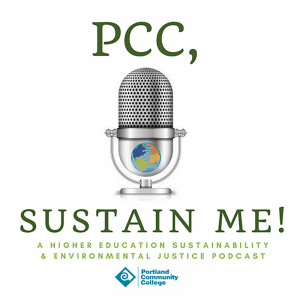This content was published: October 8, 2018. Phone numbers, email addresses, and other information may have changed.
Episode #7 – Renea Perry & Portland’s 1st Annual Tribal Nations Summit
Posted by joe.culhane

It’s Indigenous Peoples’ Day. And a little over a week ago the 1st Annual Tribal Nations Summit took place here in Portland, Oregon. This podcast episode was released last Tuesday though an official blog post had yet to be published. So on this day where we recognize and honor the Indigenous People around the country and world, it is fitting to share this post as it is directly in relation to honoring the First Nations people of this land.
Below is a glimpse into the episode. May we all work to better #HonorNativeLand as we move forward with our human story…
Thank you for tuning in, folks. I am pleased to report that on the morning of Friday, September 28th, on what was a rather warm early autumn day, with clear blue skies and the moon still showing in the sky off to the west, a very special occasion took place between The City of Portland as a governmental agency and many regional tribes from this area near the confluence of the Columbia and Willamette Rivers. I had the honor of speaking with Renea Perry after the ceremony, about PCC and also about its relation and connection to the events that took place on this day.

The Canoes approach on the Willamette. On board is mayor Ted Wheeler and City Commissioner Chloe Eudaly along with members of the local tribes of this area.
Before I move forward, I would like to add here the land acknowledgment that is said in each podcast and it is an important part of this narrative that is being built through, PCC, Sustain Me!
I would first like to acknowledge that this program is being recorded on the traditional village sites of the Multnomah, Kathlamet, Clackamas, bands of the Chinook, Tualatin Kalapuya, Molalla and many other Tribes who made their homes along the Columbia River. Multnomah is a band of Chinooks that lived in this area.
We thank the descendants of these tribes for being the original stewards and protectors of these lands since time immemorial. We also acknowledge that Portland, OR has the 9th largest Urban Native American population in the U.S. with over 380 federally recognized tribes represented in the Urban Portland Metropolitan area. We also acknowledge the systemic policies of genocide, relocation, and assimilation that still impact many Indigenous/Native American families today.
We are honored by the collective work of many Native Nations, leaders and families who are demonstrating resilience, resistance, revitalization, healing and creativity. We are honored to be guests upon these lands. Thank you, and thanks also to our colleagues at the Portland State University Indigenous Nations Studies Program for crafting this acknowledgement.
I admittedly have very limited knowledge on this ceremony that took place on the waterfront. I was pleased that my friend and fellow student leader from this past school year, Renea Perry was kind enough to discuss the significance of today’s events afterwards. Renea also explored what PCC and PSU are doing when it comes to bringing both more inclusion, and awareness to the large indigenous, native population in this region. This included talking about murdered and missing indigenous women which is an important topic.?Renea Perry is a citizen of the Klinkit-Haida Nation of South-East Alaska, White Mountain and Nupiack from north Alaska and North European as well.

Pulling up to the shore to ask permission to come upon these native lands…
It was an honor to bear witness to this ceremony that began the 1st Annual Tribal Nations Summit. The summit’s theme was “Coming Together as One”. It was part of the official launch of the Tribal Relations Program and the Portland City Council Resolution 36941 that officially brings a genuine relationship between the Tribal Government Partners and the City of Portland. Big thanks to Renea Perry for sharing some story with me, Rachel Black Elk for the work done between PCC and PSU, Judy Bluehorse Skelton and all the incredible work she has done at both PCC, PSU, Cully Park and this whole region as well, big love to all the wonderful people of Native American Youth and Family Center (NAYA), the folks at Native American Rehabilitation Association (NARA) which are both here in Portland, and to all the first nations, native people here in this region who continue to persevere and let their light shine.

Tribal Relations Director Laura John “This is the next big step towards implementing the City’s government-to-government tribal relations program”
As always, thanks for tuning in, folks.

